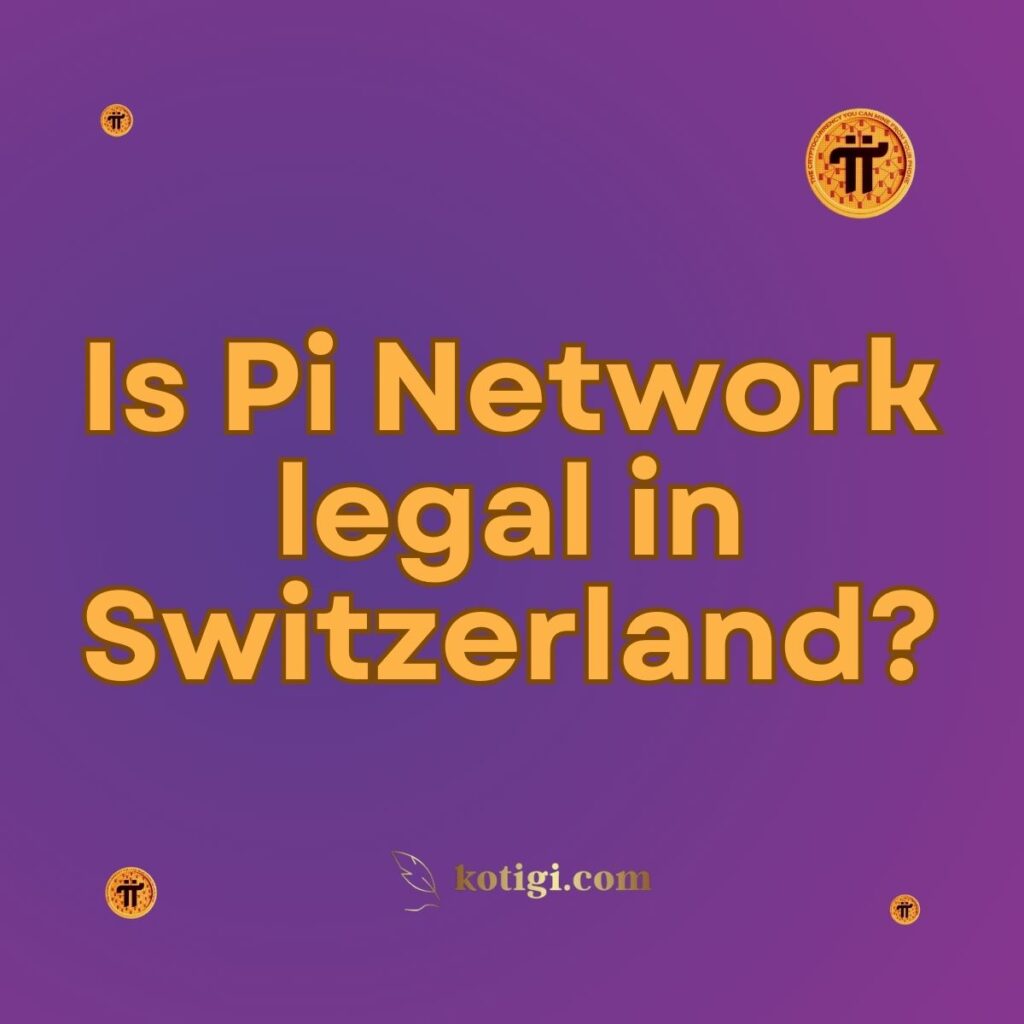
Is Pi Network legal in Switzerland?
Yes, Pi Network is legal in Switzerland. While there is no specific regulation for Pi Network or mobile mining, Switzerland’s cryptocurrency-friendly legal framework allows for its use and operation, provided that users comply with anti-money laundering (AML) and financial regulations.
Introduction
As one of the world’s leading countries in cryptocurrency innovation, Switzerland has garnered a reputation for its openness to blockchain technology and digital currencies. With the growing interest in Pi Network—a mobile mining platform that allows users to mine Pi tokens through their smartphones—questions about its legality and regulatory standing in Switzerland have emerged.
This article explores Pi Network’s legal status in Switzerland, covering the regulatory environment for cryptocurrencies, compliance with financial and AML laws, and what Swiss users need to know about engaging with Pi Network.
Overview of Switzerland’s Cryptocurrency Regulations
Legal Status of Cryptocurrencies in Switzerland
Switzerland is known for its progressive stance on cryptocurrencies, allowing individuals and businesses to use, trade, and mine digital assets like Bitcoin, Ethereum, and Pi. Cryptocurrencies are legal, but they are not classified as legal tender. Instead, they are viewed as digital assets, subject to the country’s financial regulations.
This framework provides Swiss users with the freedom to participate in Pi Network’s mobile mining activities without legal barriers. However, Pi Network users must ensure compliance with the country’s financial laws to avoid any legal complications.
Swiss Government’s Stance on Cryptocurrency Platforms
The Swiss government has welcomed cryptocurrency platforms, blockchain startups, and related technologies, establishing Crypto Valley in the canton of Zug as a hub for blockchain development. While platforms like Pi Network are not specifically regulated, Switzerland’s regulatory environment encourages the responsible use of cryptocurrencies and requires compliance with relevant financial laws, including taxation and anti-money laundering measures.
Compliance with AML and KYC Regulations in Switzerland
Anti-Money Laundering (AML) Laws in Switzerland
Switzerland has stringent anti-money laundering (AML) regulations that apply to all financial activities, including cryptocurrency transactions. While Pi Network is not classified as a financial institution, users engaging in Pi Network’s mobile mining activities are still expected to follow Switzerland’s AML laws.
For Pi Network, this means that users should complete the platform’s Know Your Customer (KYC) process to confirm their identity. This helps ensure that Pi Network aligns with global standards for combating illegal financial activities, such as money laundering or terrorism financing.
KYC Verification on Pi Network
Pi Network’s KYC process plays a vital role in maintaining compliance with Swiss AML laws. By verifying their identity, Swiss users help uphold the platform’s integrity and reduce the risks associated with cryptocurrency transactions. Additionally, completing the KYC process ensures that Swiss users are following the necessary legal protocols to avoid potential scrutiny from regulatory authorities.
Cryptocurrency Taxation in Switzerland
Taxation Guidelines for Pi Network Users
Switzerland has clear guidelines for cryptocurrency taxation, and Swiss residents who engage in cryptocurrency mining, trading, or other related activities are required to report their gains. While Pi tokens are not yet tradable, once they become available on exchanges, Swiss users will need to include any income from Pi tokens in their annual tax filings.
Cryptocurrencies are treated as assets in Switzerland, and their value must be declared as part of a user’s net wealth. Any gains or losses from the sale of Pi tokens would be subject to capital gains tax, depending on whether they fall under personal wealth management or business income.
Reporting and Paying Cryptocurrency Taxes
Swiss residents must report their cryptocurrency holdings to the tax authorities. For Pi Network users, this means that once Pi tokens become available for trading, they will need to keep accurate records of all transactions. Swiss users should consult a tax advisor to ensure proper reporting and compliance with Swiss tax laws. Failing to report cryptocurrency earnings may result in penalties from Swiss tax authorities.
Legal Risks and Financial Considerations for Swiss Pi Network Users
Financial Risks of Engaging with Pi Network
While Pi Network offers an innovative approach to mobile mining, it is important for Swiss users to understand the financial risks involved. Cryptocurrencies, including Pi, are known for their volatility and may fluctuate in value once they become tradable. Any losses incurred through cryptocurrency transactions are not protected by Swiss financial authorities.
Swiss users should conduct thorough research and consider the risks before investing significant time or resources into Pi Network. The Swiss Financial Market Supervisory Authority (FINMA) does not provide any protection or recourse for financial losses in unregulated digital assets like Pi tokens.
Legal Compliance for Swiss Pi Network Users
Although Pi Network is currently legal in Switzerland, Swiss users must ensure compliance with all applicable financial and AML regulations. Completing the KYC process, reporting cryptocurrency earnings, and maintaining proper records will help users avoid potential legal issues. Swiss regulatory bodies like FINMA and the Swiss tax authorities monitor cryptocurrency activities, and non-compliance can result in fines or legal consequences.
Switzerland’s Role in Blockchain Innovation
Government Support for Blockchain and Cryptocurrencies
Switzerland is at the forefront of blockchain innovation, and its regulatory framework is designed to encourage the growth of decentralized technologies. The establishment of Crypto Valley in Zug has attracted blockchain startups and cryptocurrency exchanges from around the world, making Switzerland a global leader in the sector.
The Swiss government’s positive stance on blockchain technology is a good sign for platforms like Pi Network, as it creates a supportive environment for mobile mining and decentralized applications. Pi Network users in Switzerland benefit from this favorable legal environment, allowing them to engage with the platform without facing restrictive regulations.
Integration of Blockchain in Swiss Industries
Switzerland is increasingly adopting blockchain technology across various industries, including finance, healthcare, and supply chain management. As blockchain continues to gain traction, Pi Network’s decentralized model aligns well with the country’s focus on innovation and transparency. Swiss users who engage with Pi Network may be part of a broader movement towards greater adoption of blockchain technologies in everyday applications.
Potential Regulatory Changes Affecting Pi Network
EU Regulations and Switzerland’s Position
While Switzerland is not a member of the European Union, it maintains close economic ties with the EU and often aligns its financial regulations with EU standards. The European Commission’s proposed Markets in Crypto-Assets (MiCA) framework aims to create a comprehensive regulatory environment for cryptocurrencies across the EU. Although Switzerland has its own regulatory framework, any major developments in EU cryptocurrency regulations could influence Switzerland’s approach to platforms like Pi Network.
Preparing for Future Regulations
Swiss Pi Network users should stay informed about potential regulatory changes that could affect the platform’s operations. As cryptocurrencies become more integrated into the global financial system, additional regulations could be introduced to address security, consumer protection, and financial stability. By completing Pi Network’s KYC process and adhering to existing regulations, Swiss users can remain compliant even if new laws are enacted in the future.
Legal Stability for Pi Network in Switzerland
Switzerland’s Supportive Legal Environment
Switzerland’s legal framework for cryptocurrencies is well-established and stable, allowing platforms like Pi Network to operate without facing significant legal challenges. As long as users comply with the country’s financial and AML regulations, they can participate in mobile mining and other cryptocurrency activities without concern.
Long-term Prospects for Pi Network in Switzerland
As Pi Network continues to develop and its tokens become tradable, Swiss users will need to adapt to any new regulations that arise. The country’s regulatory environment is likely to remain favorable for blockchain technologies, but users should remain vigilant and prepared to meet any future compliance requirements. By staying informed and compliant, Swiss Pi Network users can continue to enjoy the benefits of the platform in the long term.
Conclusion
Pi Network is legal in Switzerland, and the country’s cryptocurrency-friendly regulatory environment provides a supportive framework for users to engage in mobile mining and other activities on the platform. However, Swiss users must adhere to existing financial and AML regulations, complete the KYC process, and report any future earnings from Pi tokens to avoid legal risks.
Switzerland’s leadership in blockchain innovation and its progressive approach to cryptocurrency regulation make it an ideal environment for Pi Network. As the platform evolves, Swiss users can expect continued support from the government, provided they remain compliant with financial regulations and stay informed about any potential legal changes.
Key Takeaways
- Legal Status: Pi Network is legal in Switzerland, and users can engage in mobile mining without legal restrictions.
- Cryptocurrency Taxation: Swiss users must report any future earnings from Pi tokens to tax authorities and comply with tax regulations.
- AML and KYC Compliance: Completing the KYC process ensures Pi Network users remain compliant with Switzerland’s anti-money laundering laws.
- Financial Risks: Cryptocurrency activities carry financial risks, and users must be cautious when engaging with Pi Network.
- Blockchain Innovation: Switzerland’s support for blockchain technology aligns with Pi Network’s decentralized vision.
- Regulatory Changes: Swiss users should stay informed about potential regulatory changes to remain compliant with future laws.




